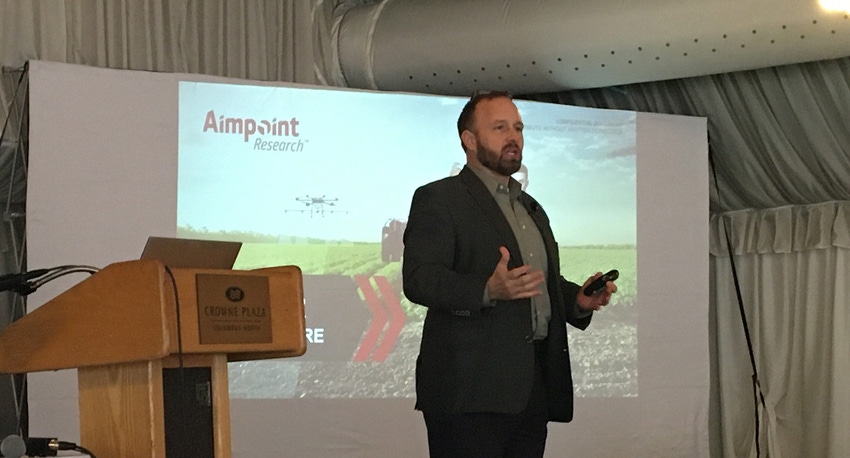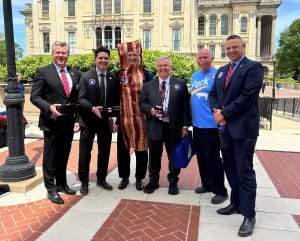Who will be the pork producers of the future?
Research identifies farmer segments who possess attributes most likely to navigate future industry dynamics.

What will the next generation of pork producers look like? According to Scott Caine, executive vice president and chief operating officer at Aimpoint Research, by 2040 more than 70% of the industry will be made up of the "Independent Elites" and "Enterprising Business Builders."
"When we look at the marketplace, we fundamentally believe that those things that define the business leaders in the future are likely to be those attributes we [most often see] in the 'Enterprising Business Builders' and 'Independent Elites.' This is not because they were the only producers to innovate, change or grow over the last five years, but because the folks that [we refer to as] 'Classic Practitioners' right now need to change in order to survive and have not made that decision. [Many of those who we refer to as] 'Leveraged Lifestylers' are likely to either go out of business or change," Caine says. "The word of the day is change and [rounding out the remaining farmers] we fundamentally believe that the 'Self-Reliant Traditional' isn't going to change, and God bless them because they're going to be around forever, but they're also not going to be part of this economy that's changing."
So, what makes a producer an "Independent Elite" versus a "Leveraged Lifestyler" and how does that determine if they will be part of the farmers of the future?
In 2018, Aimpoint Research completed a quantitative psychographic segmentation of farmers and ranchers across the United States. The study was inclusive of all commodities and focused on farmers who are 55 years and younger. Farmers were asked to express how well psychographic and attitudinal statements related to them. Topics addressed included business IQ, financial health, expert consultation, brand loyalty and importance of co-ops and associations.
They were then placed into one of five segments via cluster analysis.
Independent Elites today make up 20% of the farming population. They can afford to be early adopters of technology and management practices that give them a competitive advantage. They are innovative, open to change and secure in their knowledge. This group is the least reliant on safety nets and tends to believe that government programs only help poorly run farms stay in business longer. They see significant opportunity in the current environment and believe success is within their control.
Enterprising Business Builders account for 21% of farmers today and are aggressive, growth-oriented with a high business IQ. They seek advice, best practices and collaboration with anyone who can help make them better operators. While they are not reliant on safety nets, they will take advantage of them if beneficial. They are the least traditional, most adaptable and entrepreneurial growers.
Classic Practitioners, 24% of the ag population, are still trying to grow and succeed but are struggling. They are under increasing financial pressure and tend to be more reliant on safety nets. They believe that success is not fully in their control and they lack some resources and business IQ needed to get to the next level. This group tends to be more traditional and less innovative.
Self-Reliant Traditionals are no longer focused on growth, but instead just trying to maintain their current operation. This 22% of farmers and ranchers remain resilient financially, because they have focused on saving money and staying true to their traditional ways of farming. Self-Reliant Traditionals tend to have a lower business IQ, are more resistant to change and are the least innovative.
Leveraged Lifestylers, at 14%, are the most at-risk compared to other segments. Leveraged Lifestylers feel they have done everything right in their farming operations, but that external factors have hindered their success and finances. This group prefers the lifestyle of farming more than the business of farming and relies on government programs and safety nets for survival in the current environment.
"We feel pretty confident saying that the future of farming is more business oriented, is about adaptability, is about checking and finding those new opportunities to grow, is looking for collaboration and is looking for the opportunity to understand where [producers] can grow and change in the market place," Caine says. "In order for us to remain relevant, we need to understand that the marketplace is changing. Moreover, the marketplace, it's not just us; it's everything from the production through the consumption. And consumers do have an outweighed influence on this market and that is not going to change."
What will this future marketplace look like for the pork industry? Caine says expect to see the following potential impacts from today until 2040:.
Significant tightening and clarifying of supply chains from retailer to farm
Inputs are going to go through transformative consolidation, similar to pork
Feed will have to be as traceable, transparent and sustainable as the animals
Consumer demand, shared value-driven supply, with Millennials/Gen Z food preferences dominant
Increased regulation of animal agriculture
Growth of plant-based and cellular protein alternatives
New genetic tools will increase productivity, decrease disease
Fewer, larger contributors to Checkoff
Need to serve and support increasingly diverse farmers and farm operations
Need to clearly communicate Checkoff benefits to business-focused farmers and meet higher requirements of return on investment
Opportunity to connect growers with premium markets
Opportunity to help farmers navigate increased scrutiny, accountability and requirements for efficiency, sustainability, transparency, traceability and data management
"We need to understand that working collaboratively up and down that food chain is going to make a difference between whether or not we are in control," Caine says. "We're being controlled; it's our advocacy that you have the opportunity to influence [the agri-food value change], maybe even help grow the business."
While the results from their research is a lot to digest, Caine says it's important to remember the Abraham Lincoln quote, "the best thing about the future is that it comes one day at a time."
"We're not expecting change to happen overnight, and it will not happen overnight. These changes are going to happen gradually, but what we must be aware of is that changes are happening, that the face of farming is changing," Caine says. "We've got to watch for the indicators and the opportunities … lean into those opportunities and make sure that when we're communicating ... [we do so in] a way that can be heard by the person we're talking to."
About the Author(s)
You May Also Like




